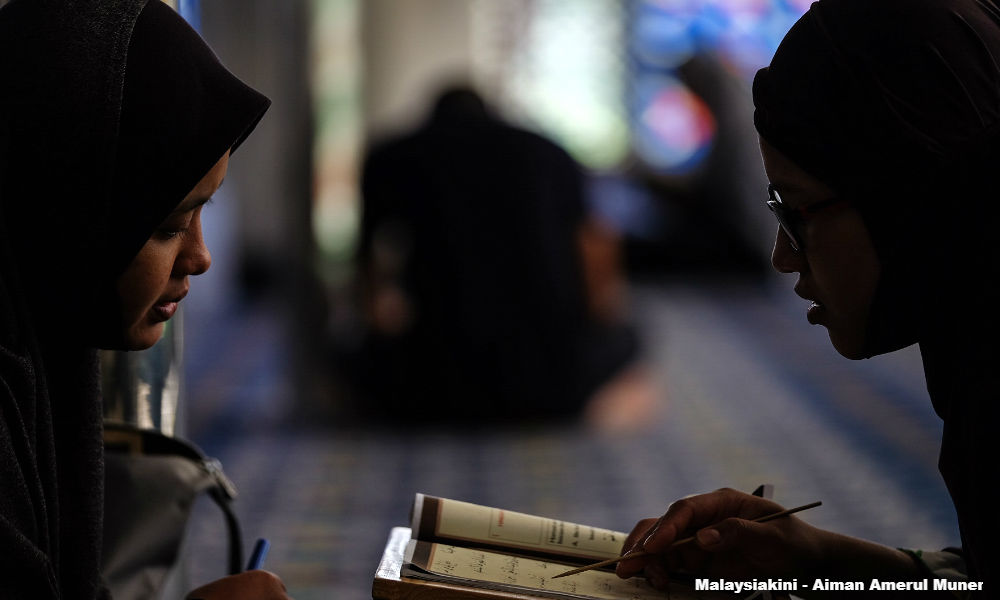
There was a time when I frequented the mosque. Some of my best epiphanies happened when I was in the mosque, as I like to observe my surroundings and the mosque is often a quiet place to think.
Though not the friendliest of places for women, I frequented the mosque anyway, especially when the mosque is empty.
Growing up, Muslim girls are not encouraged to go to the mosque. It is said that it is better for us to pray at home, where we do not become distractions for the men praying at the mosque. Whereas men are more than encouraged to go, making the mosque a very male-dominated space.
Prayer space for women is often much smaller compared to men's. While the big mosques often have large spaces for women, the majority of mosques and surau (smaller Muslim prayer halls) dedicate very small portions of the compound for women. And the space for women is always at the back, never front or center.
I used to go to the mosque as much as I could, even though I avoid the peak, crowded hours. I went for many of the lectures to learn about my religion, until I grew tired of always having to listen from behind a curtain.
That was not the only thing I grew tired of. I also grew tired of the scarcity of women speakers at the mosque. It is always women who have to listen to men's lectures, but not the other way around. Topics on women also mostly revolve around being the ideal woman, according to the interpretation and standards of men, not from the perspectives of actual, real-life women.

So that means the ideal Muslim woman is limited to her role as a good daughter, a good wife, a good mother. We do not hear stories of the modern Muslim woman, who could and should be encouraged to pursue a career alongside raising a family. We do not hear stories of actual Muslim women who are still alive, only the repeated stories of Khadijah, Aisyah, Fatimah r.a., who are very important women in Islam, but they're long gone.
Besides, I have heard their stories a thousand times, do I really have to keep listening to this basic knowledge even after going to the mosque for many years? How does this contribute to progressing my knowledge on Islamic history if nothing else is ever brought up?
But, l ike I said, some of my best epiphanies happened when I visited the mosque. One example is the wisdom behind the choice of slipper sizes for mosque visitors.
I noticed that the slippers that were bought for visitors who came to pray, were bought the biggest sizes possible. The reason for that is to accommodate for people with large feet, more than those with small feet, to avoid breaking the slippers. Because people with small feet could fit the big slippers, but not the other way around.

When we accommodate something for the greater good of society, we should open up the space as large as possible, so as to fit those with the greatest need for such space. If we don't provide enough space for them to exist, we create a community that is inconsiderate and intolerant of those who don't "fit" in the kind of shoes (or slippers) that we ask of them to use, not just for their convenience, but also for our own (because broken slippers need repair and replacement on a regular basis).
There is great wisdom in this seemingly tiny act of common sense.
When we demand social justice for the infringed and marginalised i.e. the poor, the disadvantaged, the disabled, the LGBTQ + community, the ethnic and religious minorities, etc, we must learn from these slippers.
The existence of those who conform to the majority have much less need for a hospitable environment, because the environment has been created just for them to be happy and to thrive. These are the people who could fit even the smallest slippers, and they wouldn't break much of the social norms and therefore wouldn't experience the kind of discomfort that occurs when we don't provide big slippers.
Imagine this, and imagine a life where big slippers don't exist for people with large feet, and extend that experience to any kind of social environment you can think of.
For the sake of the greater good, we need "big slippers" in law, social norms and in the understanding of people's existence. Nobody should be punished for who they are, no matter what shape or size, what socio-economic background or ethnicity, what sexual identity.
It is our duty as a society to provide for the many, not to serve the political interests of the few.
But do mosques today teach this philosophy to their visitors? Or have they become a site for fear-mongering and hate-speech? I fear the latter has been the trend for a while now, contributing to the decline of intellectualism within the Muslim community.
MARYAM LEE is a writer with a chronic tendency to get into trouble. What she lacks in spelling when writing in English is made up for with her many writings in Bahasa Malaysia. She believes in conversations as the most valuable yet underrated cause of social change. She wants people to recognise silences and give them a voice, as she tries to bring people together through words.- Mkini



No comments:
Post a Comment
Note: Only a member of this blog may post a comment.